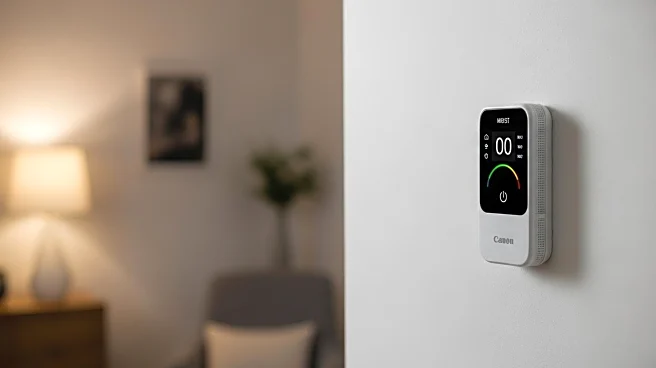What's Happening?
As temperatures drop, concerns about heating bills rise, prompting interest in smart thermostats that claim to save money through advanced algorithms. Brands like Nest, Ecobee, Honeywell Home, and Amazon offer models with features designed to optimize energy usage. These thermostats use learning algorithms and portable sensors to adjust heating and cooling settings based on household activity patterns, potentially leading to significant savings. For example, Ecobee's smart thermostats can proactively lower temperatures when residents are away, conserving energy without sacrificing comfort. Research indicates that users of the Nest Learning Thermostat save an average of 12% to 15% annually, translating to $131 to $145 in savings. Ecobee reports potential savings of up to 26%, which could amount to $250 annually.
Why It's Important?
Smart thermostats represent a growing trend in energy-efficient home technology, offering consumers a way to reduce utility bills and environmental impact. As heating costs rise, these devices provide a practical solution for managing energy consumption. The potential savings can be particularly beneficial for renters who pay for their electricity, though they may need permission to install such devices. The widespread adoption of smart thermostats could lead to reduced energy demand and lower carbon emissions, aligning with broader environmental goals.
What's Next?
Consumers may explore additional savings by participating in peak usage programs offered by utility companies, which adjust thermostat settings during high-demand periods to save energy. Ecobee offers a Community Energy Savings program that provides financial incentives for participation. Additionally, consumers should investigate local rebates and incentives for purchasing smart thermostats, as many utility companies offer rebates for Energy Star-rated models. As smart home technology continues to evolve, further innovations in energy management are likely.
Beyond the Headlines
The adoption of smart thermostats reflects a shift towards more sustainable living practices, emphasizing the role of technology in achieving energy efficiency. This trend may encourage further development of smart home devices that integrate with broader energy management systems, potentially transforming how households consume and conserve energy. The ethical implications of data collection by smart devices also warrant consideration, as privacy concerns may arise.









